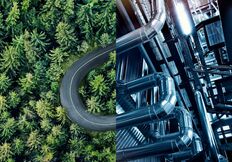- The plant will begin production in 2026 and produce 500,000 tons of SAF and renewable diesel annually.
- Topsoe's HydroFlex™ technology will be used to convert renewable feedstocks like agricultural waste, fats, oils, and greases.
- Construction of the plant started in February 2024.
- The new facility aims to achieve net zero emissions in the medium term.

Project Overview
Cepsa and Bio-Oils are set to begin production at their new second-generation biofuels plant in Palos de la Frontera, Spain, in 2026. The facility is expected to produce 500,000 tons of Sustainable Aviation Fuel (SAF) and renewable diesel annually, doubling their total renewable fuels production capacity to 1 million tons per year.
Technology and Feedstocks
Topsoe will supply its HydroFlex™ technology for the project. This technology enables the production of SAF and renewable diesel from renewable feedstocks, including agricultural waste, fats, oils, and greases. The licensing agreement marks Topsoe’s first HydroFlex™ order in Spain.
Construction Timeline
Construction of the plant began in February 2024. The facility is designed to emit 75% less CO2 than a traditional biofuel plant and aims to achieve net zero emissions in the medium term.
Market Demand
The new plant addresses the growing demand for SAF. According to the International Energy Agency’s Net Zero Scenario, over 10% of aviation fuel needs to be SAF by 2030 to meet net zero CO2 emissions by 2050. In 2022, global SAF production was estimated to be only 0.1% to 0.15% of total jet fuel demand.

